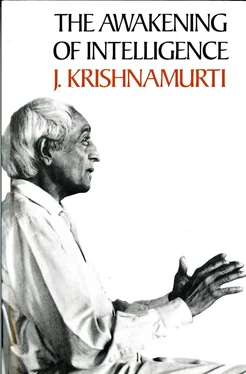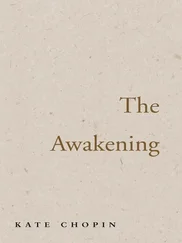J. Krishnamurti - The Awakening of Intelligence
Здесь есть возможность читать онлайн «J. Krishnamurti - The Awakening of Intelligence» — ознакомительный отрывок электронной книги совершенно бесплатно, а после прочтения отрывка купить полную версию. В некоторых случаях можно слушать аудио, скачать через торрент в формате fb2 и присутствует краткое содержание. Жанр: unrecognised, на английском языке. Описание произведения, (предисловие) а так же отзывы посетителей доступны на портале библиотеки ЛибКат.
- Название:The Awakening of Intelligence
- Автор:
- Жанр:
- Год:неизвестен
- ISBN:нет данных
- Рейтинг книги:5 / 5. Голосов: 1
-
Избранное:Добавить в избранное
- Отзывы:
-
Ваша оценка:
- 100
- 1
- 2
- 3
- 4
- 5
The Awakening of Intelligence: краткое содержание, описание и аннотация
Предлагаем к чтению аннотацию, описание, краткое содержание или предисловие (зависит от того, что написал сам автор книги «The Awakening of Intelligence»). Если вы не нашли необходимую информацию о книге — напишите в комментариях, мы постараемся отыскать её.
The Awakening of Intelligence — читать онлайн ознакомительный отрывок
Ниже представлен текст книги, разбитый по страницам. Система сохранения места последней прочитанной страницы, позволяет с удобством читать онлайн бесплатно книгу «The Awakening of Intelligence», без необходимости каждый раз заново искать на чём Вы остановились. Поставьте закладку, и сможете в любой момент перейти на страницу, на которой закончили чтение.
Интервал:
Закладка:
So in the understanding of “what is”—not by comparing “what is” with “what should be”—in that understanding flowers goodness. Surely, goodness has nothing whatsoever to do with thought—has it? Has love got anything to do with thought? Can you cultivate love by formulating it and saying, “My ideal of love is that”! Do you know what happens when you cultivate love? You are not loving. You think you will have love at some future date; in the meantime you are violent. So is goodness the product of thought? Is love the product of experience, of knowledge? What was the second question, Sir?
Questioner: The second question was about sharing .
KRISHNAMURTI: What do you share? What are we sharing now? We talked about death, we talked about love, about the necessity of total revolution, about complete psychological change, not to live in the old pattern of formulas, of struggle, pain, imitation, conformity and all the rest of those things man has lived for through millennia and has produced this marvellous, messy world! We have talked about death. How do we share that together?—share the understanding of it, not the verbal statement, not the description, not the explanations of it? What does sharing mean?—to share the understanding, to share the truth which comes with the understanding. And what does understanding mean? You tell me something which is serious, which is vital, which is relevant, important, and I listen to it completely, because it is vital to me. To listen vitally, my mind must be quiet, mustn’t it? If I am chattering, if I am looking somewhere else, if I am comparing what you are saying with what I know, my mind is not quiet. It is only when my mind is quiet and listens completely, that there is the understanding of the truth of the thing. That we share together, otherwise we can’t share; we can’t share the words—we can only share the truth of something. You and I can only see the truth of something when the mind is totally committed to the observation.
To see the beauty of a sunset, the lovely hills, the shadows and the moonlight—how do you share it with a friend? By telling him, “Do look at that marvellous hill”? You may say it, but is that sharing? When you actually share something with another, it means you must both have the same intensity, at the same time, at the same level. Otherwise you can’t share, can you? You must both have a common interest, at the same level, with the same passion—otherwise how can you share something? You can share a piece of bread—but that’s not what we are talking about.
To see together—which is sharing together—we must both of us see; not agree or disagree, but see together what actually is; not interpret it according to my conditioning or your conditioning, but see together what it is. And to see together one must be free to observe, one must be free to listen. That means to have no prejudice. Then only, with that quality of love, is there sharing.
Questioner: How can one quieten, or free the mind, from interruptions by the past?
KRISHNAMURTI: You cannot quieten the mind: full stop! Those are tricks. You can take a pill and make the mind quiet —you absolutely cannot make the mind quiet, because you are the mind . You can’t say, “I will make my mind quiet”. Therefore one has to understand what meditation is—actually, not what other people say it is. One has to find out whether the mind can ever be quiet; not: how to make the mind quiet. So one has to go into this whole question of knowledge, and whether the mind, the brain cells, which are loaded with all the past memories, can be absolutely quiet and come into function when necessary; and when it is not necessary, be completely and wholly quiet.
Questioner: Sir, when you speak of relationships, you speak always of a man and a woman or a girl and a boy. Will the same things you say about relationships also apply to a man and a man, or a woman and a woman?
KRISHNAMURTI: Homosexuality?
Questioner: If you wish to give it that name, Sir, yes .
KRISHNAMURTI: You see, when we are talking of love, whether it is of man and man, woman and woman, or man and woman, we are not talking of a particular kind of relationship, we are talking about the whole movement, the whole sense of relationship, not a relationship with one, or two. Don’t you know what it means to be related to the world?—when you feel you are the world. Not as an idea—that’s appalling—but actually to feel that you are responsible, that you are committed to this responsibility. That is the only commitment; not to be committed through bombs, or committed to a particular activity, but to feel that you are the world and the world is you. Unless you change completely, radically, and bring about a total mutation in yourself, do what you will outwardly, there will be no peace for man. If you feel that in your blood, then your questions will be related entirely to the present and to bringing about a change in the present, not to some speculative ideals.
Questioner: The last time we were together, you were telling us that if someone has a painful experience and it is not fully faced, or is avoided, it goes into the unconscious as a fragment. How are we to free ourselves from these fragments of painful and fearful experiences, so that the past won’t have a grip on us?
KRISHNAMURTI: Yes, Sir, that is conditioning. How does one free oneself from this conditioning? How do I free myself from my conditioning of the culture in which I was born? First, I must be aware that I am conditioned—not somebody telling me that I am conditioned. You understand the difference? If somebody tells me I am hungry, that’s something different from actually being hungry. So I must be aware of my conditioning, which means, I must be aware of it not only superficially, but at the deeper levels. That is, I must be aware totally. To be so aware, means that I am not trying to go beyond the conditioning, not trying to be free of the conditioning. I must see it as it actually is, not bring in another element, such as: wanting to be free of it, because that is an escape from actuality. I must be aware. What does that mean? To be aware of my conditioning totally, not partially, means my mind must be highly sensitive, mustn’t it? Otherwise I can’t be aware. To be sensitive means to observe everything very, very closely—the colours, the quality of people, all the things around me. I must also be aware of what actually is without any choice. Can you do that?—not trying to interpret it, not trying to change it, not trying to go beyond it or trying to be free of it—-just to be totally aware of it.
When you observe a tree, between you and the tree there is time and space, isn’t there? And there is also the botanical knowledge about it, the distance between you and the tree—which is time—and the separation which comes through knowledge of the tree. To look at that tree without knowledge, without the time-quality, does not mean identifying yourself with the tree, but to observe the tree so attentively, that the boundaries of time don’t come into it at all; the boundaries of time come in only when you have knowledge about the tree. Can you look at your wife, or your friend, or whatever it is without the image? The image is the past, which has been put together by thought, as nagging, bullying, dominating, as pleasure, companionship and all that. It is the image that separates; it is the image that creates distance and time. Look at that tree, or the flower, the cloud, or the wife or the husband, without the image!
If you can do that, then you can observe your conditioning totally; then you can look at it with a mind that is not spotted by the past, and therefore the mind itself is free of conditioning. To look at myself—as we generally do—I look as an observer looking at the observed: myself as the observed and the observer looking at it. The observer is the knowledge, is the past, is time, the accumulated experiences—he separates himself from the thing observed.
Читать дальшеИнтервал:
Закладка:
Похожие книги на «The Awakening of Intelligence»
Представляем Вашему вниманию похожие книги на «The Awakening of Intelligence» списком для выбора. Мы отобрали схожую по названию и смыслу литературу в надежде предоставить читателям больше вариантов отыскать новые, интересные, ещё непрочитанные произведения.
Обсуждение, отзывы о книге «The Awakening of Intelligence» и просто собственные мнения читателей. Оставьте ваши комментарии, напишите, что Вы думаете о произведении, его смысле или главных героях. Укажите что конкретно понравилось, а что нет, и почему Вы так считаете.












